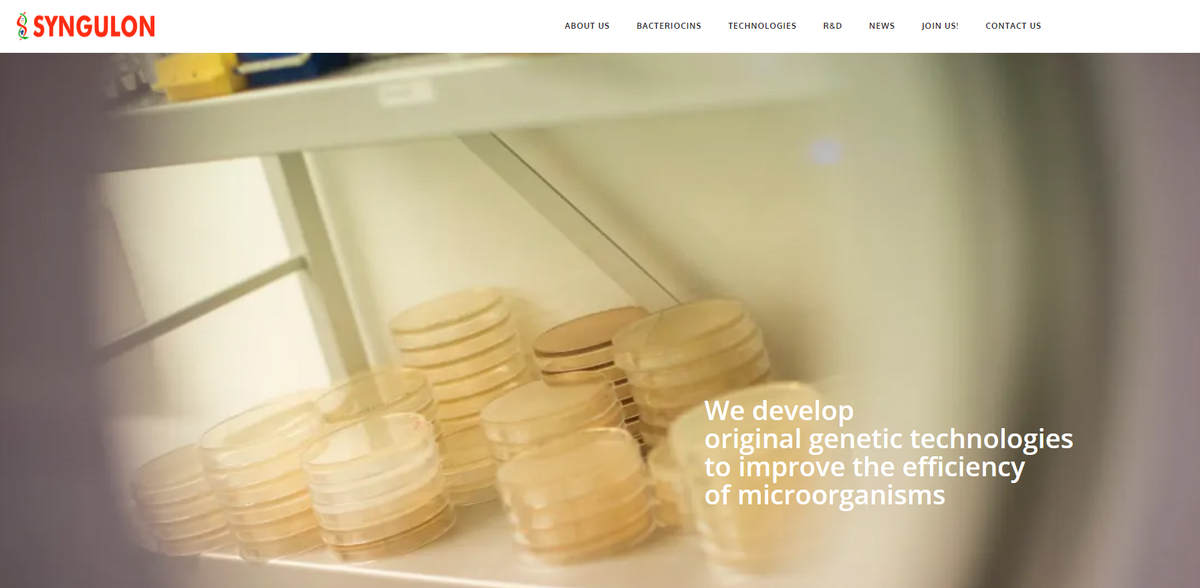What the Project Is
Syngulon is a synthetic biology startup developing original genetic technologies using bacteriocins to improve microbial fermentation. The team of scientists works across different academic laboratories, with research and development programs supported by partners in Belgium, Brazil, France, Germany, The Netherlands, and the UK. Often described as a “Startup in the Labs,” Syngulon operates directly within the labs of its academic partners. This unique approach not only strengthens academic collaboration but also drives innovation in the field of synthetic biology.
Main Benefit
Syngulon delivers a breakthrough selection technology that focuses on the control of microorganismal growth. The technology leverages bacteriocin/immunity mechanisms in bacteria, yeast, or algae, making it possible to manage growth under controlled conditions (as evidenced by US Patents 9,333,227/10,188,114). The following key figures and facts highlight the advantages and accomplishments:
- Genetic technologies increasing safety and efficiency for microbial strains used in industrial processes
- Strong academic partnerships spanning multiple countries
- Demonstrated selection technology efficacy at lab scale
- Customizable bacteriocins for applications in open or semi-open fermentors based on metagenomic analysis of contaminants
- Innovative synthetic biology approach to modify bacteriocin spectra and create novel bacteriocins
Scientific Research and Innovation
Research in this scientific project takes a deep dive into bacteriocins, which are ribosomally-produced, genetically encoded antimicrobial peptides produced by a wide variety of microorganisms. With the power of synthetic biology, it is now possible to revisit the genetic code of bacteriocins to modify their spectrum of action or even create entirely new variants. This research opens up possibilities previously unimagined in traditional methods, providing promising alternatives to antibiotics in an era of rising antimicrobial resistance (AMR). The approach is innovative and has the potential to transform the way microbial fermentations are optimized.
Collaborative Academic Environment
At Syngulon, close collaboration with universities is essential. Working directly in academic laboratories not only supports strong alliances with experts from notable institutions such as Université Catholique de Louvain, Université libre Bruxelles, Université libre de Bruxelles, Université de Mons, Gembloux Agro-Bio Tech – Université de Liège, University College of London, and Imperial College London, but also fosters an environment that is rich in academic research and experimentation. This collaboration is key to generating publishable data on bacteriocin production and understanding their interactions within microbial networks, ensuring that every advancement is grounded in rigorous scientific inquiry and practically applicable results.
Technological Applications
The practical applications of Syngulon’s technologies are vast and impactful. The startup has developed a collection of both natural and synthetic bacteriocins, sometimes referred to as PARAGEN, which can be used individually or in cocktails to manage microorganism growth without resorting to antibiotics or environmentally unfriendly chemicals. This technology is versatile enough for producing recombinant products under sterile conditions as well as for optimizing operations in open or semi-open fermentors. The customization of bacteriocins based on metagenomic analysis not only demonstrates technical prowess but is also a testament to the commitment to environmental sustainability and industrial safety.
Academic Research Focus Areas
The laboratory research linked to Syngulon focuses on three interconnected topics. First, there is an exploration of RNA metabolism in long-term nutrient-starved bacteria, a field that sheds light on bacterial survival under extreme conditions. Second, the project delves into the phage takeover of bacterial transcription and other cellular processes, a subject that is inherently intriguing and widely applicable in biotechnology. Third, the transcriptional regulatory basis of bacteriocin expression is being studied in both mono and polymicrobial environments. These research avenues are deeply intertwined with the synthetic biology advancements that Syngulon brings forward, reinforcing the startup’s role as an integral part of academic innovation.
Project Impact
- Sustainable Development Goal 3: Good Health and Well-being – offering alternatives in microbial control to reduce reliance on traditional antibiotics
- Sustainable Development Goal 9: Industry, Innovation, and Infrastructure – enhancing industrial processes through advanced genetic technologies
- Sustainable Development Goal 12: Responsible Consumption and Production – supporting environmentally friendly methods in microbial fermentation
- Sustainable Development Goal 17: Partnerships for the Goals – fostering collaborations between academic institutions and industry
Forward-Looking Perspectives
In a continuously evolving landscape, Syngulon stands out as a pioneering project that combines cutting-edge synthetic biology with robust academic partnerships. By developing original genetic technologies and leveraging the natural capabilities of bacteriocins—whether used alone or combined as cocktails—the startup is not only addressing contemporary challenges in microbial fermentation but is also paving the way for environmentally sustainable alternatives to antibiotics and chemical-based processes. The dynamic and innovative spirit of the project is complemented by its firmly established academic roots, which ensure that every breakthrough is both scientifically valid and industrially relevant. In short, Syngulon’s journey illustrates the power of combining natural biological insights with modern genetic engineering—a journey that is as promising as it is exciting.


















